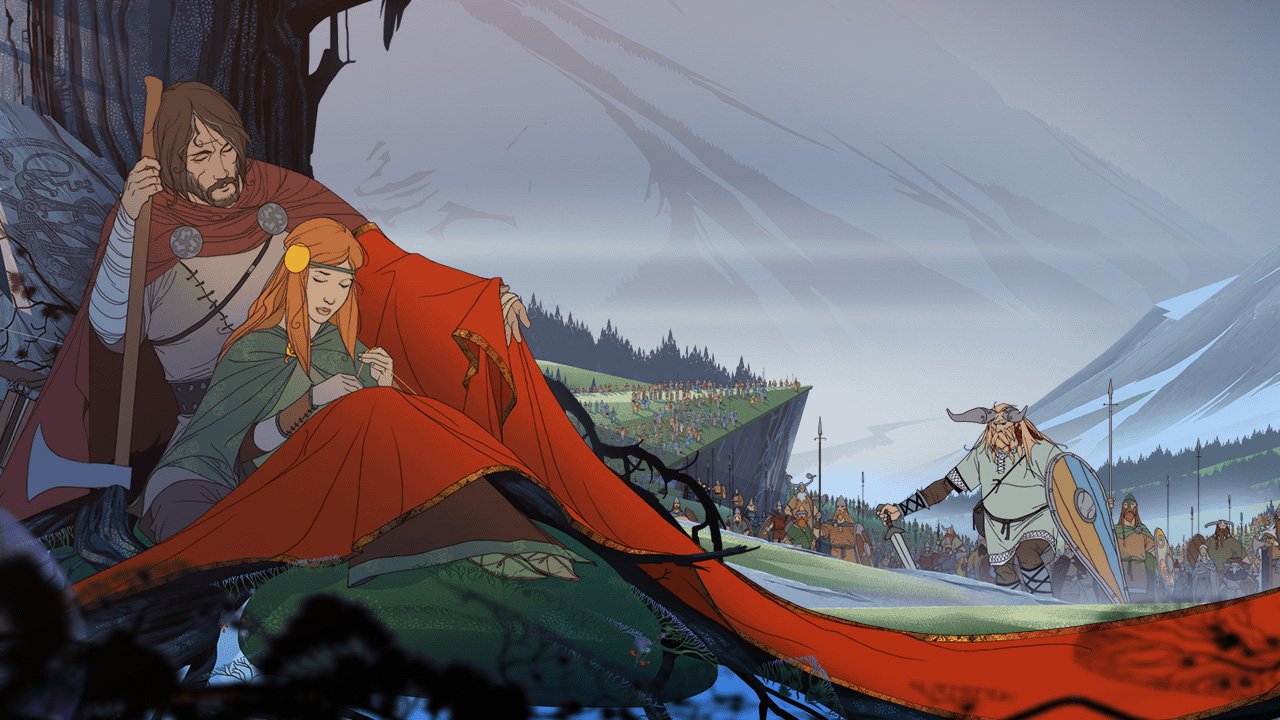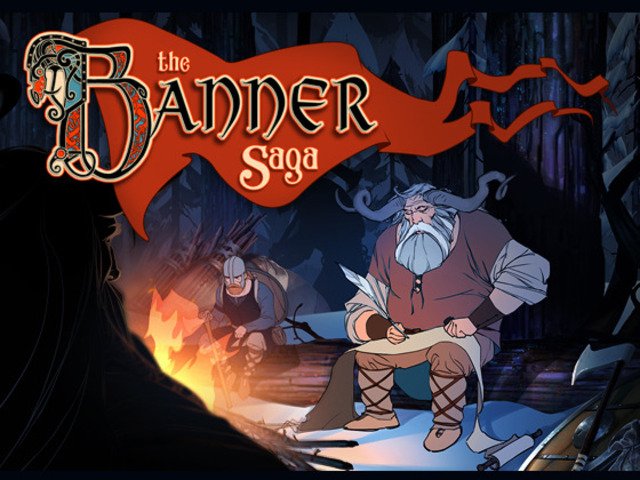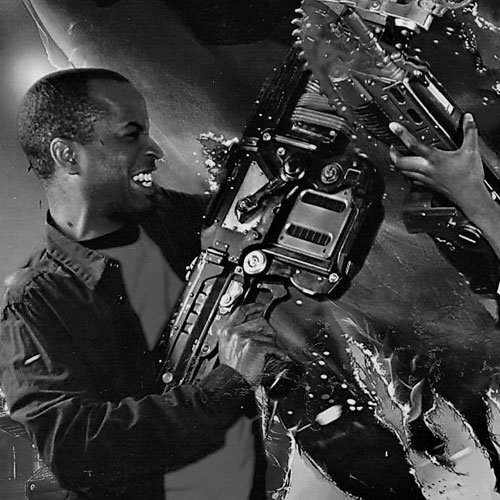After a long, two-year wait, developer Stoic Studio and publisher Versus Evil’s The Banner Saga has completed its troubled passage from PC and Mobile to PlayStation 4 and Xbox One, bringing its unique and visually-striking Viking-themed take on western RPGs to a whole new audience of gamers. Back in 2014, our own Reid McCarter gave the PC version a 9 out of 10, praising it as an “(exceptional) combination of well-designed strategy with grand storytelling”, and as a console diehard that has been awaiting this translation of the game for some time now, I’m relieved to say that none of that grandeur or complexity has been lost, though there might be a few places that could have used some balance re-tweaking for its console audience.
The intriguing plot of The Banner Saga remains the same. The sun has mysteriously affixed itself in the sky and banished the night, the gods are long dead, and the harsh, brutal civilization left in their absence has been governed for generations through a fragile alliance between the race of man and a horned race of giants called the Varl. When the re-emergence of a common enemy called the Dredge surges into the lands from the northern wastes and begins slaughtering all in their wake, the shaky truce between Man and Varl is stretched to the breaking point.
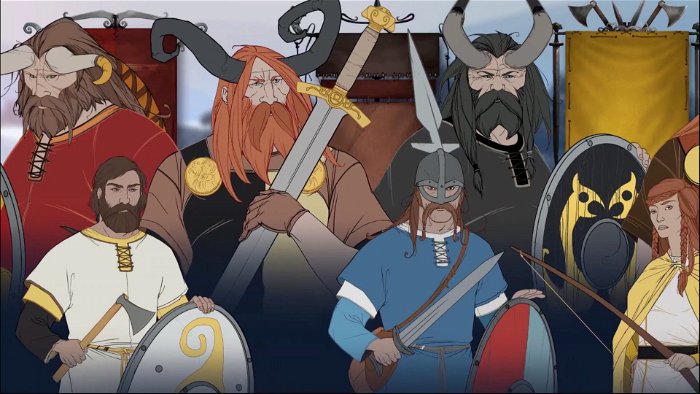
Unlike most RPGs that focus on a central hero’s story, The Banner Saga sees the player alternating between the separate journeys of two large caravans (one led by humans and the other Varl) that are unknowingly fated to cross paths later in the game. While the player has no direct control over either group’s ultimate destination, the decisions he or she makes as the caravan leader both in and out of battle will often have dire and completely unexpected consequences. With no manual save function, large gaps of gameplay between autosaves, and a plot that much like the journey of its heroes takes few moments to rest, the game immerses the player in the caravans’ desperate march for survival against the Dredge, all with the elements and in-fighting among its own members providing a refreshingly ample taste of what a leader’s burden in wartime must actually be like.
While an adequately deep turn-based strategy RPG lies at the heart of this game, much of The Banner Saga’s most compelling moments take place outside of it, either through events and conversations that spring up along the march, or during similar situations when the caravan has stopped to rest at camp or town. Players navigate these moments using simple choose-your-own adventure-style decision and dialogue trees, but the ripple effects that result from those choices can be so dire that no action can ever be taken lightly. For example, the opportunity to stop and help a group of strangers in need can be good, bad or both. Adding them to your ranks can give you the advantage in numbers when encountering enemies and apply bonuses to your stats when going into battle against a large group of foes, but those new additions also mean more mouths to feed, which will deplete your supplies faster, and once your supplies are gone, human clansmen, fighters, and Varl alike will starve and die off each day. Worse, that group may actually be part of a band of brigands that will ambush your caravan immediately or silently make off with a cart of your precious supplies at the next rest stop.
It is this element cause and effect that will ultimately inform every choice that is laid before the player, making most encounters a tense affair. Thankfully, some of them, like the optional conversations you can have with key party members in town, are completely innocuous, allowing players to get a little more into the heads of the characters as well as their past, or glean more of the game world’s deep lore. Conversations involving the long-lived Varl, who constantly scoff at the comparative size and frailty of their human allies, as well as the more “imbalanced” human characters that for one reason or another have joined the caravan just so they can kill things are among the most entertaining, as they are often a delightfully unexpected source of dark humour.
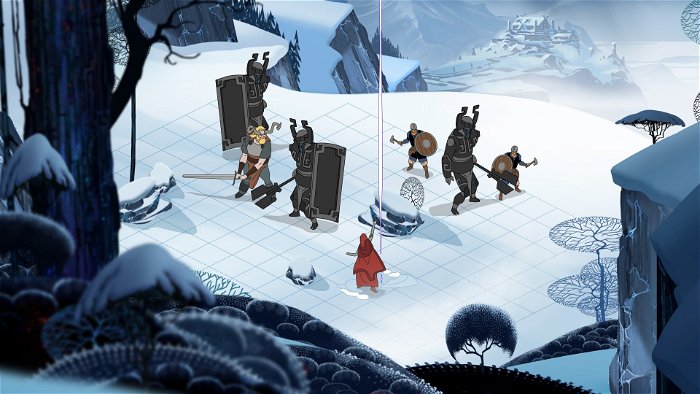
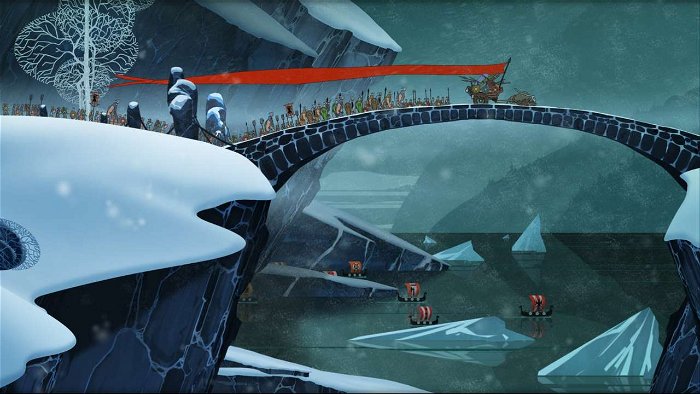
With such great emphasis placed on player decisions and their dramatic outcome, the tactical, turn-based battle system employed by The Banner Saga at times feels more like a secondary component that exists primarily to serve the former, and can potentially become less and less enjoyable as the game moves on. The main problem lies in the game’s ethereal, unified currency, called Renown, which is needed to purchase caravan supplies, level up party members and acquire special items that can be given to characters to boost certain stats or abilities. Naturally, battles are the game’s greatest and most consistent source of Renown, with victories rewarding the player with greater amounts than losses, but the currency can also be earned outside of battle as a reward for positive outcomes stemming from important player decisions (these moments are much fewer and farther between, however). This is clearly by design, as having limited Renown forces the player to carefully weigh leveling up characters versus buying items and conserving supplies, but this mechanic falls apart late in the game when the difficulty ramps up and players find themselves consistently on the losing side of battles because they did not properly allocate their Renown into the right characters and items from the outset. At the cost of breaking the game’s illusion of having to make difficult choices, players would be better served to pump all their Renown into leveling up characters from the beginning and risk letting their caravan starve in order to have a better chance of winning battles down the road, because losing battles over and over will ultimately result in failstates that can only be passed by reloading a much earlier save, switching to “Easy Mode”, or starting over entirely.
Despite these problems, however, The Banner Saga‘s strong narrative, exquisite visual design, and distinctive thematic approach to RPGs coupled with its insistence on making every decision and conversation have an impact on player experience make it a must-buy for Strategy-RPG fans. With Stoic Studio and Versus Evil having confirmed this game to be the first in a trilogy, it’s this reviewer’s hope that they will take the above along with the many other well-documented criticisms of the game’s balance issues to heart while they work on the sequel. And here’s hoping that console owners won’t have to wait another 2-4 years to play it!
